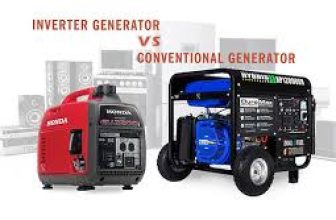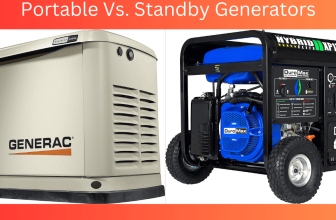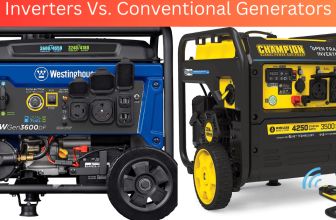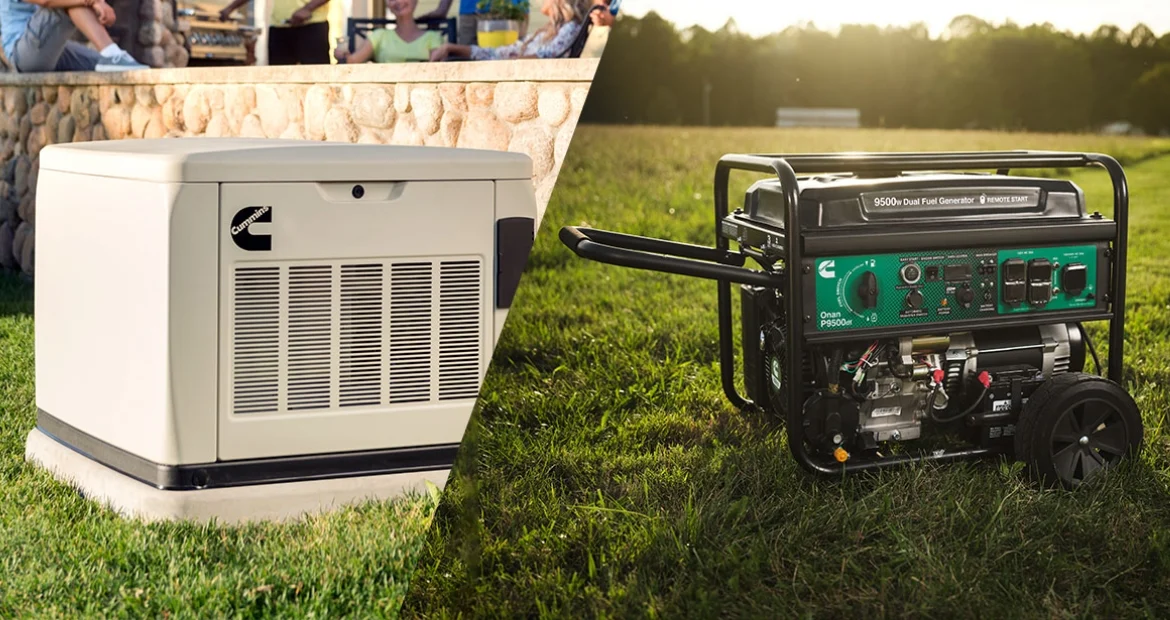
Introduction to Portable vs Standby Generators
Power outages can cause significant disruptions to our daily lives, and having a reliable backup generator is essential in ensuring that your home remains operational during these events.
In this blog post, we will discuss the differences between portable and standby generators, including their advantages and disadvantages, cost considerations, safety features, and much more.
By understanding the key distinctions between these two types of generators, you’ll be able to make an informed decision on which option best suits your needs for continuous power supply during unexpected outages.
Key Takeaways
- Portable generators are cost – effective, versatile, and easy to use, but have limited power output, short runtime, and safety concerns like carbon monoxide emissions.
- Standby generators offer seamless automatic power backup for an entire home without refueling needs or carbon monoxide risks. However, they require professional installation and maintenance that comes at a higher cost than portable options.
- When deciding on the type of generator to choose from, consider your specific energy needs during outages or emergencies while weighing in factors such as budget limitations and required effort for usage preparation & safety concerns.
Basics Of Portable And Standby Generators
A portable generator is a smaller unit that can be moved around and typically powered by gasoline, while a standby generator is permanently installed and connected to the home’s natural gas or liquid propane line.
What Is A Portable Generator?
A portable generator is a versatile and compact power source that can be easily moved from one location to another, making it perfect for supplying temporary electricity during emergencies or outdoor events.
These generators typically run on gasoline, diesel, or propane fuel, providing an independent energy supply when you need it the most.
The key benefit of using portable generators lies in their flexibility and ease of transport. You can quickly set up these units at different places like construction sites, campsites, tailgating parties, or even your backyard if required.
Some popular models like those from Cummins offer user-friendly features such as low oil shutdown and overload protection for added safety during operation.
What Is A Standby Generator?
A standby generator is a dependable backup power solution that’s permanently installed outside your home, ensuring that you never have to worry about losing electricity during unexpected outages or extreme weather events.
Once installed, these systems work seamlessly with automatic transfer switches which detect any interruption in your primary power supply. Within seconds of detecting an outage, the standby generator kicks into action, supplying essential devices and appliances within your household with reliable power.
Pros And Cons Of Portable Generators
Portable generators provide a convenient and affordable backup power option, but they also come with some disadvantages.
Advantages Of Portable Generators
Portable generators offer a variety of benefits that make them a popular choice for many customers. Here are the key advantages that you can enjoy when opting for a portable generator:
- Affordability: Portable generators are typically more cost-effective than standby generators, with prices ranging from $500 to $1,500 depending on the model and features.
- Mobility: As their name suggests, portable generators can be easily moved and transported, allowing you to use them in various locations such as camping trips or outdoor events.
- Easy setup: Unlike standby generators, which require professional installation, portable generators can be set up quickly without any special tools or expertise.
- Flexibility: Portable generators come in various sizes and power outputs, so you can choose one that best meets your specific energy needs at any given time.
- Dual-fuel capabilities: Some portable generator models run on both gasoline and propane, offering flexibility in terms of fuel choices and improving overall fuel efficiency.
- Manual control: While standby generators have automatic transfer switches for detecting power outages, with portable generators you have direct control over when to start and stop the unit, allowing for better management of your energy consumption during an outage.
- Lower maintenance requirements: Compared to standby generators, portable units typically require less upkeep due to their simpler design and lower usage frequency.
- Quick refueling options: Refilling a portable generator’s fuel tank is easy – just pour in some gasoline or connect it to a propane tank – helping you avoid lengthy downtime during extended outages.
- Versatility in power distribution: With multiple outlets available on most models, you can plug in various devices directly into the generator or use extension cords to distribute power across your home or worksite according to your priorities during an outage situation.
- Emergency backup power source: A portable generator acts as a reliable backup power supply for essential devices like refrigerators or medical equipment during extreme weather events and power outages, ensuring you have the energy you need when it matters most.

Disadvantages Of Portable Generators
As a possible customer, it’s important to know the disadvantages of portable generators before making a decision. Here are some things to consider:
- Limited Power Output: Portable generators are limited in the number of devices they can power. They’re generally designed for running a few essential appliances during an outage, rather than powering an entire home.
- Short Runtime: A typical portable generator has a runtime of 8-12 hours on a full tank of gas. If you need longer power backup, you’ll need to keep refueling your generator every few hours.
- Manual Connection Required: Portable generators require manual connection to your home’s electrical system through a transfer switch, which takes longer to set up and requires more planning than standby generators.
- Carbon Monoxide Exposure: Carbon monoxide emissions are a safety concern with portable generators since they must be placed outside and away from the home or building. Improper placement could result in carbon monoxide poisoning.
- Fuel Storage Issues: Storing fuel for portable generators is often cumbersome and requires proper care. Fuel needs to be properly stored in safe containers and kept away from any heat sources or flames.
- Noise Pollution: Portable generators can create noise pollution that can disturb neighbors or other family members if used frequently or over long periods.
- Maintenance Requirements: Regular maintenance is required for portable generators to ensure reliability when needed most, including oil changes, filter replacement and spark plug checks.
- Extension Cords Required: Heavy-duty extension cords are necessary for connecting portable generators to the transfer switch, adding extra expense and preparation time.
By understanding these disadvantages, you will be better informed when choosing between a portable and standby generator for your power backup needs during extreme weather events or grid stability issues in your area.
Pros And Cons Of Standby Generators
Advantages of Standby Generators: Standby generators can power an entire home with little to no intervention from homeowners, switch over automatically during a power outage, and are powered by natural gas or liquid propane for a more reliable fuel source.
Disadvantages of Standby Generators: The cost of standby generators is higher than portable options, often requiring professional installation and maintenance, which adds to the overall cost.
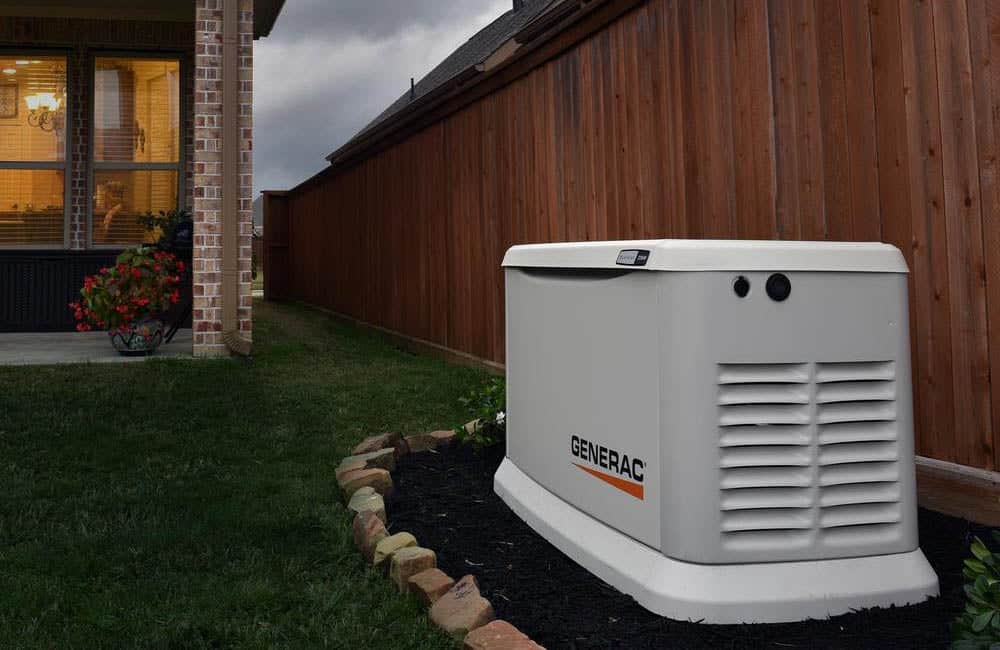
Advantages Of Standby Generators
If you’re considering a standby generator, here are some advantages to keep in mind:
- Quick and Seamless: Standby generators provide a quick and seamless experience during power outages, with an automatic transfer switch that kicks in within seconds.
- Whole-House Power Backup: Standby generators can power an entire home, including essential appliances like refrigerators, HVAC systems, and security systems.
- No Refueling Required: Standby generators are powered by natural gas or liquid propane and do not require refueling like portable generators.
- Reduced Carbon Monoxide Risk: Standby generators are often installed outdoors and reduce the risk of carbon monoxide emissions inside your home.
- More Powerful: Standby generators have a higher power output range than portable generators, making them ideal for larger homes or commercial properties.
- Reliable Power Supply for Days: Built to provide reliable power for several days, standby generators offer peace of mind during extended power outages.
- Professional Maintenance and Service Packages Available: With professional maintenance and service packages available, you can ensure your standby generator is always ready when you need it.
Overall, a standby generator is a great investment if you want reliable backup power that kicks in automatically during outages and provides enough energy to keep your whole house running smoothly.
Disadvantages Of Standby Generators
One thing to keep in mind when considering a standby generator is their higher initial purchase and installation costs. Here are some other potential drawbacks to consider:
- Maintenance and repair costs can add up over time, especially if you opt for annual service packages or experience any issues that require professional attention.
- Standby generators typically rely on natural gas or propane, which may not be available in all areas or could become more expensive over time.
- If not properly installed, standby generators could overload home circuit breakers or potentially lead to gas leaks.
- Standby generators may also be bulky and take up significant space outside your home, depending on the model and capacity you need.
- While they do offer automatic power restoration during an outage, it’s important to note that standby generators may take several seconds to switch over – meaning you could experience a brief interruption of power before backup kicks in.
Remember to weigh these potential disadvantages against the benefits of having a reliable backup power source during outages or emergencies.
Deciding On Your Power Needs
Before choosing between a portable or standby generator, it’s crucial to assess your power requirements by identifying essential appliances and devices during an outage.
Essential Appliances And Devices
Power outages can be inconvenient and even dangerous if you’re not prepared. During an outage, it’s essential to have backup power to keep your home running smoothly. Here are some key appliances and devices that you should consider powering during an emergency:
- Refrigerator/freezer: Keeping your perishables cool is crucial in the event of a prolonged power outage.
- Medical equipment: If anyone in your household requires medical equipment, such as a ventilator or oxygen concentrator, it’s vital to ensure they remain powered.
- Heating/cooling system: Extreme weather events can make it uncomfortable or even unsafe to stay in your home without proper heating or cooling.
- Communications devices: Being able to contact emergency services, loved ones, or stay informed about current events via radio is important during a prolonged power outage.
- Lighting: The ability to see during a power outage enhances safety and comfort.
Investing in a reliable generator will help ensure that these critical appliances and devices remain functioning during an outage. It’s crucial to assess your specific requirements carefully and choose the right generator for your needs.
Whole House Power Backup
As a homeowner, ensuring that your home maintains power during an outage is essential. A whole house backup generator can give you peace of mind in such situations.
With standby generators, you can rest assured that the generator will take over automatically when there’s a power failure, providing uninterrupted power to your entire home.
On the other hand, portable generators are ideal for powering selected appliances and devices during short-term outages or emergencies. They come in handy when camping or traveling away from electricity sources.
Cost Differences
Standby generators have a higher upfront cost, typically starting at around $5,000 including installation, while portable generators can cost anywhere from $500 to $1,500 depending on the size.
Initial Purchase Cost
As a possible customer, you’ll want to consider the initial purchase cost when deciding between a portable or standby generator. Portable generators are generally more affordable with prices ranging from $500 to $1,500 depending on size and features.
Standby generators, however, can be much more expensive, with prices starting around $5,000.
While it may seem like purchasing a portable generator is the more economical choice upfront, it’s important to keep in mind that standby generators often have longer lifespans than their portable counterparts.
A well-maintained standby generator can last up to 15 years and even recoup up to 50% of its initial cost when resold.
Installation Costs
Having a generator has become increasingly important in today’s world, especially considering the frequent power outages due to extreme weather events or grid instability.
When it comes to choosing between a portable and standby generator, one significant factor to consider is installation costs. Standby generators require professional installation because they need to be permanently connected to your home’s electrical system.
This adds significantly to the cost compared to portable generators that can be easily plugged into an external outlet.
It’s essential that you make sure you have a transfer switch when connecting your portable generator as it ensures safe operation during use by preventing backfeed through wires which could cause injuries or damages if not done correctly.
Maintenance Costs
I know that maintenance is one of the important factors to consider when choosing a generator. Portable generators are easier and cheaper to maintain than standby ones. They only need an annual check-up, oil change, and spark plug replacement.
It’s also worth noting that repair costs for a standby generator can be higher than those for portable models.due to their larger size. However, it’s essential to keep in mind that regular maintenance is crucial for any generator type. regardless of its size or price point.
Fuel Cost
When it comes to choosing between a portable or standby generator, fuel cost is an important factor to consider. Standby generators typically run on natural gas or liquid propane, which tend to be less expensive and more readily available than gasoline used by portable generators.
On the other hand, portable generators require regular refueling with gasoline and may consume more fuel compared to standby models due to their smaller size.
During extended power outages, this can become quite costly for homeowners who rely on their portables for prolonged periods of time.
As someone who wants peace of mind during power outages caused by extreme weather events or grid instability, considering the long-term cost-effectiveness of standby versus portable generators is crucial in making an informed decision.
Safety Considerations
It’s important to remember that both portable and standby generators can pose safety hazards if not used properly, especially when it comes to carbon monoxide emissions.
Proper Usage
Carbon Monoxide Emissions
It is crucial to be aware of the potential safety hazards associated with portable generators, particularly carbon monoxide emissions. This gas can be odorless and colorless, making it difficult to detect.
To prevent carbon monoxide poisoning, always operate your generator outside in a well-ventilated area and away from open windows or doors. Additionally, install a battery-operated carbon monoxide detector in your home to alert you if any dangerous levels are present.
Remember that standby generators emit no carbon monoxide, so they may be a safer option for those concerned about exposure to this harmful gas.
First Alert CO400 Carbon Monoxide (CO) Detector, Battery Operated Alarm, 1-Pack
Noise Levels
When it comes to generators, noise levels can be a major concern for many customers. Portable generators tend to be louder than standby generators due to their smaller size and more basic construction.
Excessive noise from your generator could cause disruption or complaints from neighbors, especially if you live in close proximity to others. It’s important to consider the location of your generator when making your decision based on noise levels as well as ensuring that the generator is properly maintained according to manufacturer instructions.
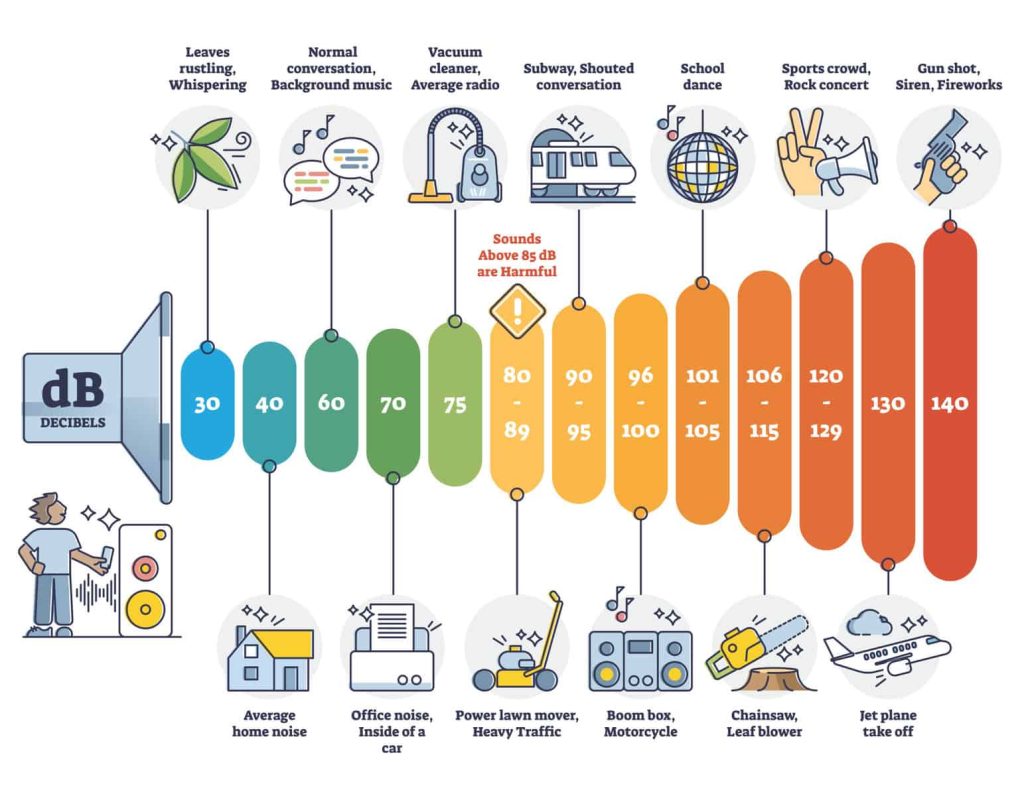
Maintenance And Reliability
Regular maintenance is essential for the reliability of your generator, regardless of whether it’s a portable or standby unit.
Regular Maintenance Requirements
Maintenance is critical for ensuring your generator runs efficiently and reliably. Here are some of the regular maintenance requirements you should keep in mind:
- Change the oil regularly to maintain engine performance and prolong its lifespan.
- Keep the air filter clean to prevent clogging and ensure proper airflow.
- Inspect and clean spark plugs to avoid issues with ignition and misfiring.
- Check battery levels and connections frequently, as they can corrode or become loose over time.
- Conduct a full system test at least once a year to check the generator’s functionality.
- Replace any worn or damaged parts immediately, such as belts or hoses, to prevent further damage or failure.
Remember that standby generators require more extensive maintenance than portable generators due to their permanent installation at home. It’s always best to follow the manufacturer’s recommended maintenance schedule and consult a professional technician for any repairs needed.
Regular maintenance not only ensures your safety but helps reduce carbon monoxide emissions, improves fuel efficiency, and extends the generator’s life span while maintaining continuous power supply during power outages.
Lifespan And Durability
From my experience working with generators, lifespan and durability are crucial factors to consider when choosing between a portable or standby generator.
Standby generators have a longer lifespan and require less maintenance than portable generators.
Generac, one of the leading manufacturers of standby generators on the market, offers a warranty period of up to 5 years or 2,000 hours of operation. This warranty covers all parts and labor costs for any repairs needed during this time.
On the other hand, maintaining a portable generator requires regular testing and servicing for optimal performance. Briggs & Stratton recommends testing your unit at least twice per year and changing oil every 50 hours or annually if you don’t reach the hour mark within one year from purchasing them.
Fuel Efficiency And Runtime
Portable generators typically use gasoline, which can be costly and require frequent refueling. Standby generators, on the other hand, are powered by propane or natural gas and have a more efficient fuel consumption rate, allowing for longer runtimes without interruption.
Types Of Fuel
As a possible customer, it’s important to know about the different types of fuel that can power your generator. Here are some common options:
- Gasoline: This is the most widely available fuel for portable generators. It’s easy to find and generally affordable, but it has a shorter shelf life than other fuels and can be dangerous to store.
- Diesel: Diesel is more fuel-efficient than gasoline and has a longer shelf life, making it a popular choice for larger portable generators as well as standby generators. However, diesel generators tend to be louder and emit more pollutants than other options.
- Propane: Propane is commonly used for standby generators because it’s clean-burning and produces fewer emissions than diesel or gasoline. It also offers a longer runtime than gasoline or diesel. However, propane tanks need to be stored safely and have limited capacity.
- Natural Gas: Like propane, natural gas is cleaner-burning than gasoline or diesel and offers a longer runtime. Standby generators powered by natural gas are often connected to your home’s gas supply line, so you don’t need to worry about refueling. However, natural gas-powered generators may not work during an extended outage if there is disruption in the grid.
It’s important to consider which type of fuel will work best for your specific needs based on factors like availability, cost, safety, efficiency, and environmental impact.
Fuel Consumption Rate
As someone who’s in the market for a generator, it’s important to consider the fuel consumption rate of your options. When you’re evaluating generators, take into account how much fuel they use per hour and how long their tanks last on average.
For example, Cummins standby generators are fueled by natural gas or liquid propane lines connected to your home, so there’s no need for refueling during an outage.
On the other hand, portable generators typically have smaller fuel tanks and burn through their fuel more quickly than standby units do – especially if running at high loads.
While some models may have higher efficiency ratings than others, it’s still crucial to factor in both initial purchase costs and ongoing operational expenses like refueling during longer outages when selecting which type of generator is right for you.
Runtime On A Full Tank
As a possible customer considering whether to invest in a portable or standby generator, one important consideration is the runtime on a full tank of fuel.
This refers to how long the generator can run continuously without needing to be refueled. Standby generators typically have longer runtimes thanks to their larger fuel tanks and greater fuel efficiency ratings.
For example, Cummins QuietConnect™ standby generators boast up to 20 hours of continuous operation on a full tank of natural gas. On the other hand, portable generators may only have smaller fuel tanks resulting in shorter runtimes before requiring refueling.
Versatility And Portability
Portable generators are designed to be lightweight and easy to transport, making them ideal for camping trips, outdoor events, or construction sites where power is needed but electricity is not readily available.
Mobile Usage
One of the biggest advantages of portable generators is their mobility. They can be used for a variety of outdoor activities such as camping, tailgating, or even powering a food truck.
Due to their compact size and lightweight design, they are easy to transport and set up on-site.
However, standby generators are not designed for mobile usage as they require permanent installation at home. While standby generators offer more power output and automatic switching during outages without any effort from homeowners, portables provide flexibility in terms of where you can use them.
Ease Of Transport
One of the main advantages of a portable generator is its ease of transport. Unlike standby generators that are permanently installed, portable generators can be easily moved around thanks to their compact size and lightweight design.
Another benefit of portability is that you can store a portable generator in your garage or shed without taking up too much space.
It’s important to remember that while portability offers convenience, it also comes with some safety considerations. For example, always make sure to turn off and cool down the generator before moving it to avoid burns or accidents.
Additionally, never operate a portable generator indoors as this could lead to carbon monoxide poisoning.
Installation Process
The installation process for generators can be complex and requires proper permits, whether you choose professional installation or decide to do it yourself – learn more about the best option for your specific needs in our upcoming section.
Professional Installation Vs. DIY
As a potential customer, you might be wondering whether to opt for professional installation or to attempt a DIY approach when it comes to setting up your generator. Here’s a comparison table to help you make an informed decision:
| Aspect | Professional Installation | DIY Installation |
|---|---|---|
| Cost | Higher upfront cost, but ensures proper installation and can save money in the long run. | Lower upfront cost, but potential for mistakes and additional expenses if problems arise. |
| Expertise | Qualified professionals have the experience and knowledge to ensure safe and efficient installation. | DIY approach may lack expertise and could result in improper installation or safety hazards. |
| Time | Professional installers can complete the job in a timely manner, allowing you to have power backup quickly. | DIY installation can be time-consuming, especially if you’re unfamiliar with the process. |
| Warranty | Many manufacturers require professional installation to maintain warranty coverage. | DIY installation may void warranty, putting you at risk for repair costs. |
| Safety | Professionals follow proper safety guidelines and can identify and resolve any potential issues. | DIY installation may involve safety risks, such as incorrect wiring or inadequate ventilation for carbon monoxide emissions. |
Keep these factors in mind when deciding between professional installation and DIY for your generator setup. Remember, standby generators, due to their complexity and electrical wiring involvement, are best handled by professionals, while portable generators are generally easier to install on your own.
Permit Requirements
Before installing a generator, it’s important to ensure compliance with local permit requirements. Both portable and standby generators require permits for installation.
Failure to obtain the necessary permits can result in fines and penalties.
For example, when connecting a portable generator to your home, the National Electric Code (NEC) requires a transfer switch, which must be installed by a licensed electrician.
Additionally, portable generators need to be placed at least 20 feet away from any structure to prevent carbon monoxide emissions from entering indoor spaces.
On the other hand, standby generators require professional installation and inspections by both local authorities and fuel suppliers before they can be used reliably.
Final Thoughts: Choosing The Right Generator For Your Needs
When deciding between a portable and standby generator, it is essential to assess your specific power requirements, weigh the pros and cons of each option carefully, consider factors like cost, safety considerations, maintenance needs, fuel efficiency and runtime, versatility and portability before making an informed decision.
Assessing Your Specific Requirements
To choose the right generator that meets your specific requirements, consider these factors:
- Determine the power output needed for your home by using a generator sizing calculator.
- List all the essential appliances and devices that need to be powered during an outage.
- Decide if you want whole – house power backup or just emergency power for a few select circuits.
- Look at fuel options available in your area such as natural gas, liquid propane, gasoline, or diesel.
- Consider runtime and fuel consumption rate to determine how long the generator will operate on a full tank.
- Think about portability and versatility requirements if you plan to use it for outdoor activities like camping or tailgating.
- Evaluate safety considerations such as carbon monoxide emissions, noise levels, and proper usage guidelines.
- Assess maintenance and reliability requirements; standby generators require less maintenance but cost more initially than portable generators.
- Analyze installation process requirements especially permit requirements if you opt for professional installation versus DIY approach
By evaluating these factors, you can make informed decisions when choosing between portable vs standby generators based on your specific needs and preferences.
Weighing The Pros And Cons
When it comes to choosing between a portable and standby generator, it’s essential to weigh the pros and cons carefully. Portable generators are more versatile and less expensive upfront, but they require more maintenance and planning from the user.
Additionally, there are safety considerations with both types of generators. Carbon monoxide emissions are a significant concern with portable generators unless used properly in well-ventilated areas.
Meanwhile, standby generators also have their safety concerns since they need professional installation; otherwise, homeowners may risk injury or equipment damage during installation by attempting a DIY approach.
Making An Informed Decision
When it comes to choosing the right generator for your needs, there are several key factors to consider. First and foremost is assessing your specific power requirements.
Are you looking to backup essential devices during a power outage or provide whole-house power coverage? This will determine the size and wattage output of your generator.
Additionally, safety considerations are crucial when using any type of generator. Carbon monoxide emissions from portable generators can be a serious health hazard if proper precautions aren’t taken, while standby generators require professional installation to ensure they’re set up safely and correctly.
Maintenance requirements and lifespan should also be factored in since regular upkeep is necessary for optimal performance and longevity.
Conclusion
When it comes to choosing between portable and standby generators, there are a lot of factors to consider. Portable generators offer versatility and portability but require more work and planning for proper usage, maintenance, installation, and safety considerations.
Standby generators provide a seamless and reliable power source with little effort from homeowners after initial installation by licensed professionals.
It all comes down to your specific needs, budget, and priorities when deciding whether to invest in a portable or standby generator solution.
Ultimately both types have their advantages and disadvantages which entirely depend on what works best for you.
FAQs:
What is the difference between a portable and a standby generator?
A portable generator runs on gasoline or propane and is typically used for temporary power needs in smaller settings, such as camping trips or powering tools at a construction site. In contrast, a standby generator is installed permanently outside of a building like homes or businesses to provide backup power during extended outages.
How much power can I expect from a portable vs standby generator?
Portable generators come in various sizes with varying capacities ranging from 500 watts up to 17,000 watts whereas Standby generators have larger capacities ranging up to more than 30,000 watts depending on the model.
Which one should I choose: Portable or Standby Generator?
It depends on your specific needs – if you need temporary emergency power for small appliances while traveling then opt-in for Portable Generators otherwise if you need an uninterrupted source of energy during longer periods of time then go with Stand-by Generators.
Can I connect my portable generator directly into my home’s electrical system?
No! it’s not safe because those plugged into your home’s wiring could cause serious injury – even death – to utility workers trying to restore service after an outage. It’s important that any connection be made using an approved transfer switch installed by professionals which will make sure that electricity never flows back into the main line.




